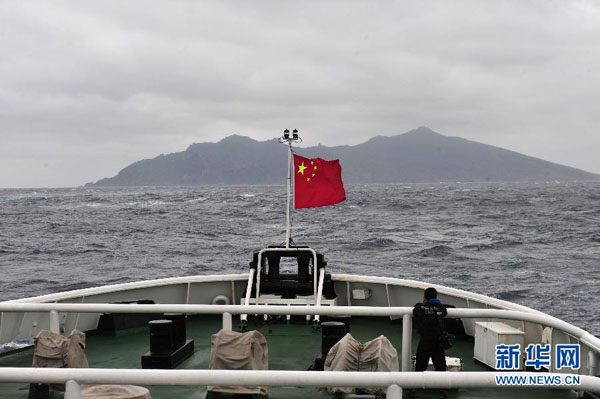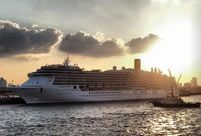 |
| Chinese marine surveillance ships have continued their regular patrols in the territorial waters surrounding the Diaoyu Islands on Feb. 15, 2013. The destination is the waters 3-nautical miles from the Diaoyu Islands. The 4-hour patrol was completed after the fleet sailed around Diaoyu Island and its affiliated islets.(Xinhua/Zhang Jiansong) |
BEIJING, Nov. 5 (Xinhua) -- The Japanese government seems to have stepped up a lobbying campaign around the world to create the illusion that the Chinese-owned Diaoyu Islands belong to Japan.
The Wall Street Journal, a mainstream U.S. newspaper, acted as a trumpet for the Japanese government, as it published an editorial Friday claiming that the sovereignty of the Diaoyu Islands has been settled by the Americans in favor of Japan in the early 1970s.
It even urged the Obama administration to be "more explicit" that the islands in the East China Sea are Japanese, so that Beijing is more likely to back down.
The editorial marks the first time for a major U.S. newspaper to publicly call on Washington to acknowledge that the Diaoyu Islands belong to Japan, since Tokyo's "nationalization" of the uninhabited islands from private hands in late 2012.
The WSJ, despite its reputed balanced news reporting, has regrettably taken an extreme stance in this editorial article.
It seems to have ignored repeated statements from the White House that the United States does not take a position on territorial disputes between China and Japan, in which America is not a directly concerned party and should remain neutral.
By siding with the Japanese, the paper has in fact fallen victim to Japan's international lobbying and served as a pawn in Tokyo's despicable scheme to usurp on the Diaoyu Islands, which have been proved the Chinese territory since ancient times.
Relevant international documents inked at the end of World War II have laid out in legal terms that the Diaoyu Islands should be returned to China. The U.S. unilateral transferring "power of administration" of the islets to Japan is utterly illegal and void.
Moreover, the journal writes in a voice quite similar to the Japanese government, which typically blames all tensions over the disputed islands on China while exculpating and even glorifying Japan's provocative actions.
In a latest move to justify his expansionist ambitions, Japanese Prime Minister Shinzo Abe said in an interview with the WSJ late October that Japan should take a greater "leadership" role in security affairs in the Asia-Pacific to counter a stronger China.
Abe has intentionally depicted China as a looming threat, because he needs to envision an enemy to lobby the international community to build a full-fledged Japanese army, shake off constraints imposed by its pacifist constitution, and challenge the post-war international order.
Any responsible newspaper should take account of such ulterior motives, and refrain from serving as a mouthpiece for campaigns against peace.
Mainstream news outlets such as the WSJ should take the lead in showing its pursuit for fact and commitment to truth, and help defuse tension for a more peaceful world, rather than act the opposite.
 Fire guts 22-storey Nigeria commercial building in Lagos
Fire guts 22-storey Nigeria commercial building in Lagos U.S. Navy Carrier Strike Group stages military exercises
U.S. Navy Carrier Strike Group stages military exercises Volkswagen showcases new energy vehicles in Beijing
Volkswagen showcases new energy vehicles in Beijing  How should we get married nowadays?
How should we get married nowadays?  Commentary:
Commentary: Jakie Chan sees Rubber Duck off in Beijing
Jakie Chan sees Rubber Duck off in Beijing Hello! Horror Halloween Celebration!
Hello! Horror Halloween Celebration!  The catwalk to the world of fashion
The catwalk to the world of fashion  Cruise trip to Taiwan
Cruise trip to Taiwan  Unveil PLA air force base
Unveil PLA air force base  Say goodbye to tube-like apartment building
Say goodbye to tube-like apartment building Oriental education or western education?
Oriental education or western education? China in autumn: Kingdom of red and golden
China in autumn: Kingdom of red and golden National Geographic Traveler Photo Contest
National Geographic Traveler Photo Contest Chinese screen goddesses from Beijing Film Academy
Chinese screen goddesses from Beijing Film Academy Day|Week|Month